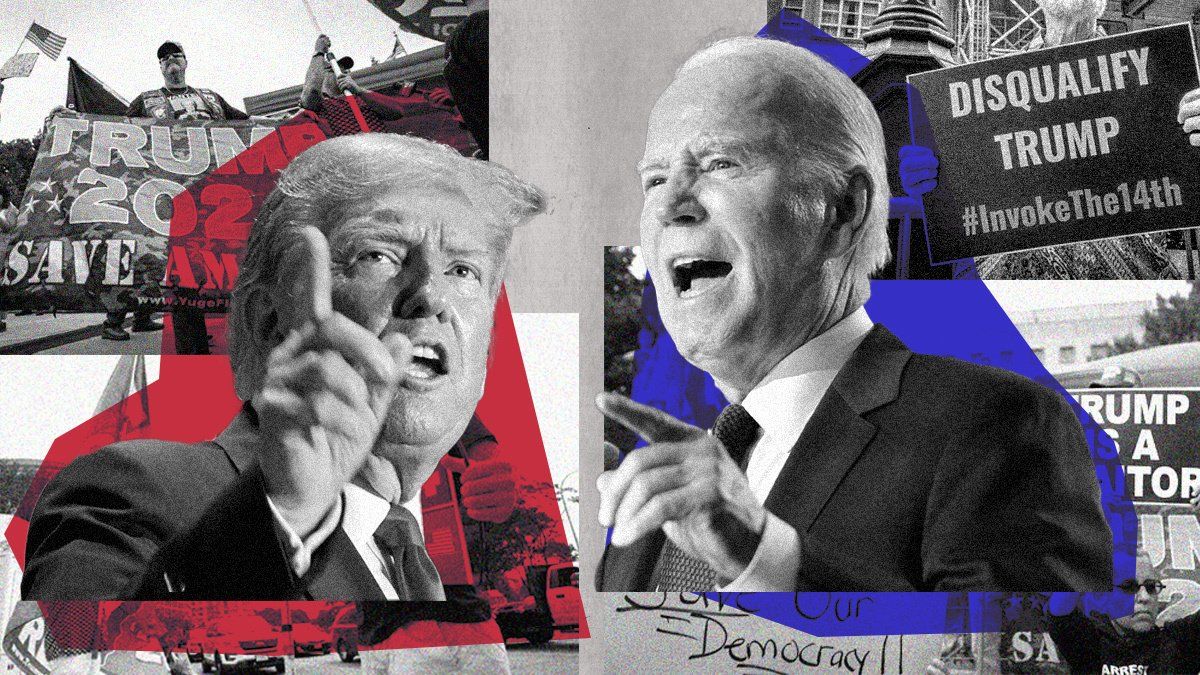June 26, 2024
Thursday night’s debate between Joe Biden and Donald Trump will be the first time a current US president debates a former one. It’s also the first time either of them has debated at all this election season — Trump skipped the Republican primary debates and Biden, as the incumbent, has debated no one on the Democratic side. Both candidates are polling at 46% nationally, so the stakes could not be higher.
With no recent debate track record for either of them, we look back at the biggest moments from their 2020 debates in search of clues for what to expect on Thursday night.
“Will you just shut up, man?”
The first Biden-Trump debate in September 2020 was chaotic. It was filled with personal attacks, name-calling, and interruptions (averaging about four interruptions per question, mostly from Trump). At one point, Biden turned to the then-president and said, shaking his head, “Will you shut up, man?”
In the second debate a month later, Biden’s prayers were answered when a policy of shutting off mics was implemented. Muting will be used as needed again in this week’s debate.
That doesn’t mean the candidates won’t still try to interrupt each other – after all, they will be in the same room, mics or not. And that’s something experts fear could rattle Biden more this time around than in the past. Since 2020, the president has become more reliant on set pieces and teleprompters, so he could pay a heavier price if Trump throws him off and he’s slow to respond.
“Abortion is not on the ballot”
In another exchange of interruptions during the first debate, Biden told viewers that “abortion is on the ballot … in the court.” But his point, that Trump had appointed a conservative majority that looked poised to overturn Roe v. Wade, was barely heard over Trump’s response: “Abortion is not on the ballot. I don’t think so. There’s nothing happening there.” Two years later, of course, the Supreme Court overturned the constitutional right to abortion, fueling a massive boost for Democrats in the midterms later that year.
On Thursday, Biden will likely try to steer the conversation toward Trump’s political vulnerabilities, and abortion tops that list. But the president will also zero in on his predecessor’s recent felony convictions and the Jan. 6 riot as part of Biden’s overarching argument that Trump is a threat to democracy. Trump will aim for Biden’s weaknesses: weak polling, popular perceptions of economic malaise, and the crisis at the Southern border.
“Proud Boys, stand back and stand by.”
When asked whether he would condemn white supremacist groups when during the 2020 debates, Trump instead told the far-right Proud Boys, from the podium, to “stand back and stand by.” This raised alarm bells at the time, and many pointed out later that Proud Boys were out in force among the rioters who led the attack on the US Capitol on Jan. 6. Biden will likely try to paint Trump as being sympathetic to extremism, racism, and violence.
Trump for his part tried to brand extremism as a left-wing problem in 2020, saying, “Almost everything I see is from the left wing, Antifa groups, not from the right wing.” This argument could go further in 2024 after Republicans have seized on the recent wave of pro-Palestine student protests as symbols of liberal-driven chaos.
Are we in for a repeat of 2020? Or have these old dogs learned new tricks in the last four years? You can take our latest poll or shoot us an email to share your thoughts. And you can watch the debate on CNN at 9 p.m. EDT on Thursday, June 27.More For You
- YouTube
In this Quick Take, Ian Bremmer examines what may come next in the US-Israel war with Iran as the Trump administration signals significantly larger military operations ahead.
Most Popular
FILE PHOTO: Canadian Prime Minister Mark Carney and India's Prime Minister Narendra Modi shake hands before posing for a photo during the G7 Leaders' Summit in Kananaskis, in Alberta, Canada, June 17, 2025.
REUTERS/Amber Bracken/File Photo
Indian Prime Minister Narendra Modi and Canadian Prime Minister Mark Carney struck a series of deals during a meeting in New Delhi on Monday, including a 10-year nuclear energy deal under which Canada will provide India with uranium.
A satellite image shows black smoke rising and heavy damage at Iranian Supreme Leader Ayatollah Ali Khamenei's compound, following strikes by the United States and Israel in Tehran, Iran, on February 28, 2026.
Pleiades Neo (c) Airbus DS 2026/Handout via REUTERS
Supreme Leader Ali Khamenei is dead, the conflict is spreading, and US President Donald Trump still isn’t clear on who he wants to run Iran.
Shipping in the world’s most crucial oil chokepoint has nearly ground to a halt after at least four tankers were targeted in Iran’s retaliation to US and Israeli strikes on Saturday.
© 2025 GZERO Media. All Rights Reserved | A Eurasia Group media company.
